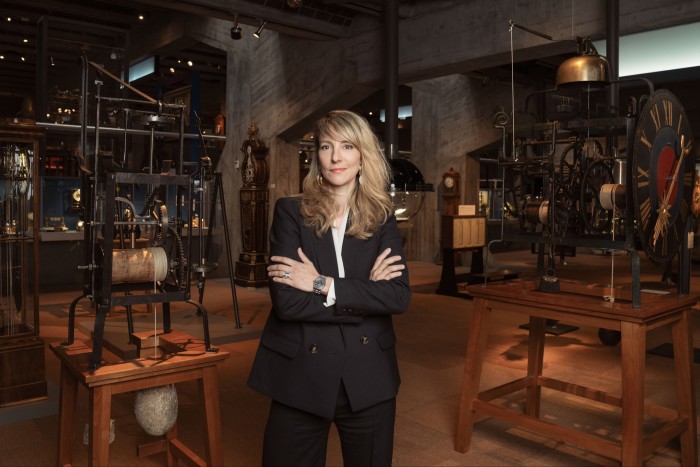How business doctorates can deliver real-world change

Simply sign up to the Business education myFT Digest -- delivered directly to your inbox.
Having spent several years working for iconic luxury brands, Céline Cheval-Calvel has observed a problem with the watch and jewellery industry’s sustainability programmes.
Most of the carbon emissions come “upstream” in the supply chain, from sourcing raw materials and manufacturing components. Yet many procurement managers struggle to ensure “responsible purchasing”, or making buying decisions that take into account not only the price and quality of raw materials, but also their effects on society and the environment.
“When responsible purchasing is managed poorly, suppliers see it as commercial hypocrisy. So the final effect is zero,” says Cheval-Calvel.
Now a commodity purchasing manager at Audemars Piguet, a luxury watchmaker in Switzerland, she decided to investigate this issue further — but not through a traditional PhD. Instead, she chose to pursue a doctorate of business administration (DBA) because of its emphasis on applied research and solving real-world business problems. It was also structured to accommodate her career, allowing her to continue working at Piguet while pursuing the degree.
Cheval-Calvel opted for the Business Science Institute’s Executive Doctorate in Business Administration, a programme designed for executives with an MBA and at least five years of management experience, run jointly with France’s IAE Lyon School of Management. Students receive the DBA from both institutions.
FT Business School Insights: Sustainability

Research by leading professors, features and academic and business opinion. Read the report here.
Between 2019 and 2022, Cheval-Calvel acquired strong research skills that enabled her to study the watchmaking supply chain in Switzerland under the supervision of an academic tutor. By interviewing 60 stakeholders, she noticed that buyers lacked the competencies needed to source responsibly, including knowledge of the traceability and origin of raw materials. That made it hard for buyers to work together with suppliers to clean up the supply chain.
But, rather than seek to merely publish her findings in an academic journal, as many researchers do, Cheval-Calvel decided to apply them in practice. She created a training and consulting organisation called Buyer Beware that educates purchasing managers and encourages responsible procurement. “A decade ago, purchasing managers were seen only as cost killers, but now they are having to tackle sustainability along the value chain,” she says.
Her practical focus is typical of many DBA candidates, according to the business schools that train them. Executives are often drawn to DBA programmes because they are eager to address challenges within their industries systematically through applied research.
“They are very good at spotting opportunities,” says Brecht Cardoen, director of the DBA programme at Vlerick Business School in Belgium. “They have access to data and industry perspectives, which ultimately increase the practical relevance of the research question.”
Moreover, their seniority at work means DBA candidates have the resources to not only originate, but also implement their research. “Of all degree programmes, the DBA is probably the best place to transmit research into practice because of the nature of the students,” says Fabio Fonti, the associate dean for faculty and research at Neoma Business School in France. “DBA candidates are typically senior managers who have the authority and network to build on the research to help nurture better businesses and societies.”
By contrast, PhD candidates are typically younger — and many choose to pursue an academic career, notes Jinnie Hinderscheit, marketing and business development manager for doctoral programmes at Grenoble Ecole de Management in south-eastern France. DBA candidates often pursue consulting, providing organisations with advice based on their thesis. “They serve as a vital bridge, connecting the business and research communities, and facilitating positive change,” Hinderscheit says.
Indeed, roughly half the Business Science Institute’s executive DBA candidates have a thesis that is linked to the UN’s Sustainable Development Goals, according to Michel Kalika, the institution’s president. It is mandatory for them to include a chapter on how the research can be useful for business and society, and while he also encourages them to publish books or articles in publications aimed at people in business.
“The main issue in management research is the gap between the business world and the academic world,” Kalika says. “The explanation is that we encourage researchers to publish only in academic journals. But we all know that many business leaders don’t read them.”
This gets to the heart of a debate among academics about whether research should be more relevant, not just rigorous. “If it’s not applicable, what is the value of it?” asks Anastasiya Saraeva, DBA programme director at Henley Business School in the UK. “True theories only make sense when we apply them to the real world. If we don’t, it’s just a graph on a bit of paper.”
But she adds that practitioners need to engage more with researchers, if the output is to be more applicable.
Other academics stress the importance of cutting-edge theoretical contributions. “It’s still important to have research that is theoretical, to advance the frontier of knowledge,” says Fabrizio Castellucci, director of the DBA at SDA Bocconi School of Management in Milan. “There is still room for pure academics.”
But many DBAs, such as Amanobea Boateng, see their research as merely the foundation for wider societal impact to emerge. Boateng founded the Women’s DNA Fund and its non-profit foundation in Ghana to help women entrepreneurs succeed by improving their business acumen. The initiative grew from her research while pursuing the DBA at Grenoble between 2012 and 2016. It showed that entrepreneurship can help alleviate poverty in deprived communities.
“Those findings were simply too important to leave in a folder on a shelf,” she says.

Comments